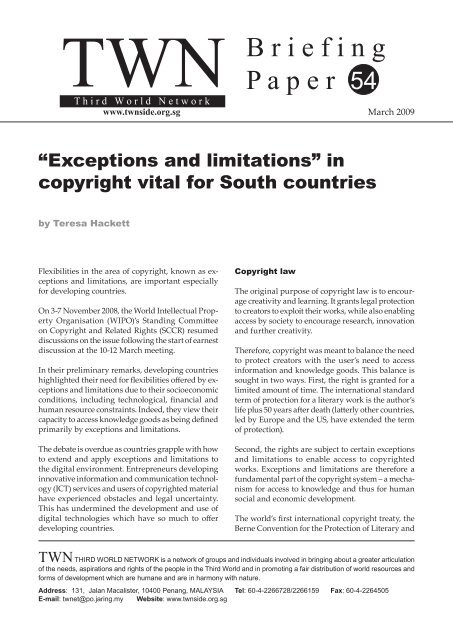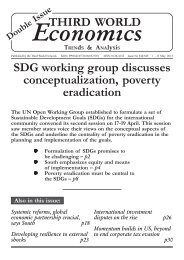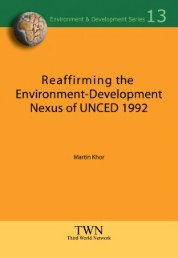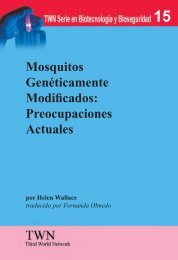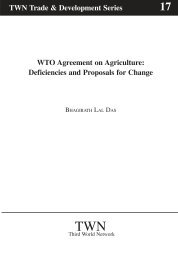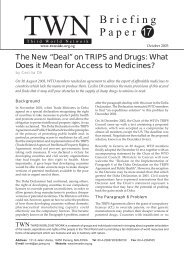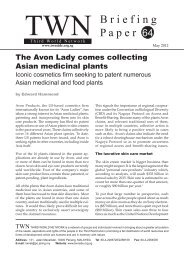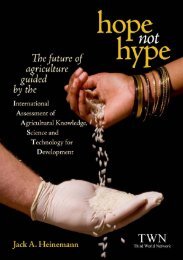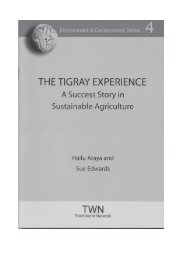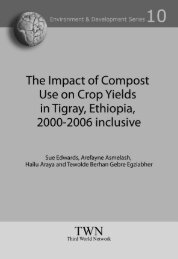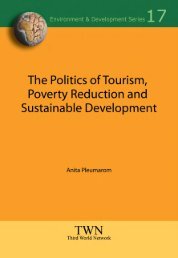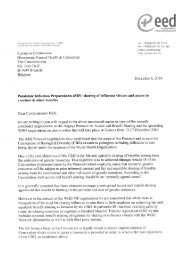Exceptions and limitations - Third World Network
Exceptions and limitations - Third World Network
Exceptions and limitations - Third World Network
Create successful ePaper yourself
Turn your PDF publications into a flip-book with our unique Google optimized e-Paper software.
TWN<br />
T h i r d W o r l d N e t w o r k<br />
B r i e f i n g<br />
P a p e r 54<br />
www.twnside.org.sg March 2009<br />
“<strong>Exceptions</strong> <strong>and</strong> <strong>limitations</strong>” in<br />
copyright vital for South countries<br />
by Teresa Hackett<br />
Flexibilities in the area of copyright, known as exceptions<br />
<strong>and</strong> <strong>limitations</strong>, are important especially<br />
for developing countries.<br />
On 3-7 November 2008, the <strong>World</strong> Intellectual Property<br />
Organisation (WIPO)’s St<strong>and</strong>ing Committee<br />
on Copyright <strong>and</strong> Related Rights (SCCR) resumed<br />
discussions on the issue following the start of earnest<br />
discussion at the 10-12 March meeting.<br />
In their preliminary remarks, developing countries<br />
highlighted their need for flexibilities offered by exceptions<br />
<strong>and</strong> <strong>limitations</strong> due to their socioeconomic<br />
conditions, including technological, financial <strong>and</strong><br />
human resource constraints. Indeed, they view their<br />
capacity to access knowledge goods as being defined<br />
primarily by exceptions <strong>and</strong> <strong>limitations</strong>.<br />
The debate is overdue as countries grapple with how<br />
to extend <strong>and</strong> apply exceptions <strong>and</strong> <strong>limitations</strong> to<br />
the digital environment. Entrepreneurs developing<br />
innovative information <strong>and</strong> communication technology<br />
(ICT) services <strong>and</strong> users of copyrighted material<br />
have experienced obstacles <strong>and</strong> legal uncertainty.<br />
This has undermined the development <strong>and</strong> use of<br />
digital technologies which have so much to offer<br />
developing countries.<br />
Copyright law<br />
The original purpose of copyright law is to encourage<br />
creativity <strong>and</strong> learning. It grants legal protection<br />
to creators to exploit their works, while also enabling<br />
access by society to encourage research, innovation<br />
<strong>and</strong> further creativity.<br />
Therefore, copyright was meant to balance the need<br />
to protect creators with the user’s need to access<br />
information <strong>and</strong> knowledge goods. This balance is<br />
sought in two ways. First, the right is granted for a<br />
limited amount of time. The international st<strong>and</strong>ard<br />
term of protection for a literary work is the author’s<br />
life plus 50 years after death (latterly other countries,<br />
led by Europe <strong>and</strong> the US, have extended the term<br />
of protection).<br />
Second, the rights are subject to certain exceptions<br />
<strong>and</strong> <strong>limitations</strong> to enable access to copyrighted<br />
works. <strong>Exceptions</strong> <strong>and</strong> <strong>limitations</strong> are therefore a<br />
fundamental part of the copyright system – a mechanism<br />
for access to knowledge <strong>and</strong> thus for human<br />
social <strong>and</strong> economic development.<br />
The world’s first international copyright treaty, the<br />
Berne Convention for the Protection of Literary <strong>and</strong><br />
TWN <strong>Third</strong> <strong>World</strong> NETWORK is a network of groups <strong>and</strong> individuals involved in bringing about a greater articulation<br />
of the needs, aspirations <strong>and</strong> rights of the people in the <strong>Third</strong> <strong>World</strong> <strong>and</strong> in promoting a fair distribution of world resources <strong>and</strong><br />
forms of development which are humane <strong>and</strong> are in harmony with nature.<br />
Address: 131, Jalan Macalister, 10400 Penang, MALAYSIA Tel: 60-4-2266728/2266159 Fax: 60-4-2264505<br />
E-mail: twnet@po.jaring.my website: www.twnside.org.sg
Artistic Works (1886), which is incorporated into<br />
the <strong>World</strong> Trade Organisation (WTO)’s Agreement<br />
on Trade-Related Aspects of Intellectual Property<br />
Rights (TRIPS), sets out the exclusive rights granted<br />
to creators <strong>and</strong> other rightsholders. The Convention<br />
also makes provision for a variety of exceptions <strong>and</strong><br />
<strong>limitations</strong> subject to certain conditions.<br />
The WIPO Copyright Treaty (WCT) Agreed Statement<br />
concerning Article 10 Limitations <strong>and</strong> <strong>Exceptions</strong><br />
states that countries may carry forward <strong>and</strong><br />
extend into the digital environment exceptions <strong>and</strong><br />
<strong>limitations</strong> in their national laws which have been<br />
considered acceptable under the Berne Convention<br />
<strong>and</strong> that new exceptions <strong>and</strong> <strong>limitations</strong> appropriate<br />
to the digital environment may be devised.<br />
Save for Article 10(1) of the Berne Convention which<br />
permits quotation of copyrighted works, exceptions<br />
<strong>and</strong> <strong>limitations</strong> are discretionary <strong>and</strong> are left<br />
for national governments to decide. This provides<br />
countries with the flexibility to create access regimes<br />
that meet national educational, cultural <strong>and</strong> development<br />
needs.<br />
However, the fact that copyright owners’ exclusive<br />
rights are international <strong>and</strong> guaranteed, <strong>and</strong> exceptions<br />
<strong>and</strong> <strong>limitations</strong> to the monopoly rights are<br />
national <strong>and</strong> optional, is perceived as creating an<br />
inherent imbalance in the copyright system.<br />
It has led to a patchwork of national exceptions <strong>and</strong><br />
<strong>limitations</strong> that do not adequately meet the needs<br />
of the global networked environment, hindering in<br />
particular cross-border activities such as distance<br />
learning, digitisation projects by libraries <strong>and</strong> exchange<br />
of material in accessible formats for blind<br />
<strong>and</strong> visually impaired people.<br />
In addition, revisions <strong>and</strong> new treaties over the years<br />
have introduced new exclusive rights, new subject<br />
matter <strong>and</strong> new modes of exploitation. <strong>Exceptions</strong><br />
<strong>and</strong> <strong>limitations</strong> have not evolved at the same pace<br />
as the development of authors’ <strong>and</strong> other rightsholders’<br />
rights.<br />
Global trends towards increased protections <strong>and</strong><br />
stronger enforcement regimes hamper access to<br />
copyrighted content, create problems for libraries<br />
<strong>and</strong> endanger the proper functioning of the copyright<br />
system. Moreover, through bilateral trade<br />
agreements, developing countries are made to adopt<br />
international st<strong>and</strong>ards of copyright protection that<br />
go beyond their WTO-TRIPS obligations.<br />
<strong>Exceptions</strong> <strong>and</strong> <strong>limitations</strong><br />
There are three broad categories of exceptions <strong>and</strong><br />
<strong>limitations</strong>. The first safeguards fundamental user<br />
rights concerning the individual. Examples include<br />
public speeches, the right to make quotations, the<br />
reporting of current events, the right to parody,<br />
reproductions for private non-commercial use <strong>and</strong><br />
home taping of audio or audio-visual works.<br />
The second category reflects commercial interest,<br />
industry practice <strong>and</strong> competition. This includes<br />
press reviews, ephemeral recordings by broadcasting<br />
organisations, museum catalogues <strong>and</strong> de-compilation/reverse<br />
engineering of computer programs for<br />
interoperability.<br />
The third category concerns society at large <strong>and</strong><br />
promotes the dissemination of knowledge <strong>and</strong> information.<br />
It includes provisions for libraries, educators<br />
for teaching <strong>and</strong> research, people with disabilities,<br />
reporting of parliamentary <strong>and</strong> judicial proceedings<br />
<strong>and</strong> religious celebrations.<br />
In addition, some countries have an “all-purpose”<br />
general exception. In the US, this is known as the<br />
doctrine of “fair use”. Codified in US copyright<br />
law, it has evolved through court decisions over the<br />
years.<br />
The UK has a similar concept known as “fair dealing”,<br />
which covers mainly research <strong>and</strong> private<br />
study, criticism <strong>and</strong> review, <strong>and</strong> news reporting. The<br />
precise definition <strong>and</strong> interpretation of fair dealing<br />
is ultimately determined by the courts. Countries<br />
which are former UK colonies are likely to have<br />
inherited British copyright law <strong>and</strong> hence the fair<br />
dealing provision.<br />
Copyright <strong>and</strong> libraries<br />
Libraries are deeply affected by copyright law. The<br />
mission of libraries is to collect, organise, preserve<br />
<strong>and</strong> make available the world’s cultural <strong>and</strong> scientific<br />
heritage for current <strong>and</strong> future generations. Different<br />
types of libraries (such as the national library,<br />
public libraries, academic libraries <strong>and</strong> workplace<br />
libraries) serve different people <strong>and</strong> purposes. But<br />
they all facilitate sound democratic governance <strong>and</strong><br />
the development of society by providing access to<br />
information, ideas <strong>and</strong> works of the imagination that<br />
people, communities <strong>and</strong> organisations need.
Libraries in developing countries are contributing<br />
to national development by supporting education<br />
<strong>and</strong> training. As the main purchasers of expensive<br />
reference works, online databases <strong>and</strong> electronic<br />
journals, they are fostering the creation of a market<br />
for information products, especially for local content<br />
industries.<br />
Digital technologies are transforming how copyrighted<br />
works are created, disseminated <strong>and</strong> used,<br />
as well as how libraries <strong>and</strong> archives preserve <strong>and</strong><br />
make these works available. ICTs create the potential<br />
to level the playing field so that even people in<br />
poor countries have access to top-quality global<br />
resources.<br />
For example, millions of academics <strong>and</strong> researchers<br />
in developing countries are benefiting from access<br />
to major databases of journals in humanities <strong>and</strong><br />
literature, science <strong>and</strong> technology <strong>and</strong> business<br />
information through their libraries, such as those<br />
available through the eIFL.net consortium (www.<br />
eifl.net). In future, students in developing countries<br />
can have access to the same resources as a student<br />
in the West.<br />
Copyright law governs the ownership, control <strong>and</strong><br />
distribution of knowledge. The role of libraries is<br />
to provide people with access to knowledge <strong>and</strong><br />
information. Copyright is therefore a professional<br />
issue for librarians.<br />
<strong>Exceptions</strong> <strong>and</strong> <strong>limitations</strong> are the cornerstone of access<br />
to copyrighted content. Without them, copyright<br />
owners would have a complete monopoly over use<br />
of copyrighted materials. Works in copyright could<br />
only be sold <strong>and</strong> lent. Libraries, <strong>and</strong> the people using<br />
them, could only view or read copyrighted materials.<br />
All other uses would require permission.<br />
This would threaten the functioning of libraries <strong>and</strong><br />
affect the public interest, including interfering with<br />
the free flow of information. Thus, libraries cherish<br />
the public policy goals enshrined in the principle<br />
of exceptions <strong>and</strong> <strong>limitations</strong>, <strong>and</strong> insist on their<br />
continued applicability in the digital age.<br />
Today, we live in a global digital environment. But<br />
the exceptions <strong>and</strong> <strong>limitations</strong> were developed in<br />
the analogue world. They are still paper-bound<br />
although the basic format for most content has become<br />
digital.<br />
The agreed statement to Article 10 of the WIPO<br />
Copyright Treaty was an attempt to provide a remedy<br />
for such future issues. More than a decade on,<br />
the issues are too complex to be addressed solely<br />
by this general statement expressing an intention.<br />
This is why libraries <strong>and</strong> others have been calling<br />
for a minimum set of exceptions <strong>and</strong> <strong>limitations</strong>, for<br />
example, as part of an international treaty on Access<br />
to Knowledge.<br />
<strong>Exceptions</strong> for libraries<br />
The recent WIPO Study on Copyright Limitations<br />
<strong>and</strong> <strong>Exceptions</strong> for Libraries <strong>and</strong> Archives (WIPO<br />
document SCCR/17/2) for the first time gathers<br />
library exceptions <strong>and</strong> provides a survey of the<br />
copyright law of 149 WIPO member states.<br />
It concludes that the prevalence of statutory library<br />
exceptions indicates that policy makers recognise<br />
the important role that copyright law plays in the<br />
ability of citizens to have continuing access to library<br />
materials. But the study also finds that there<br />
is a dem<strong>and</strong> amongst librarians for more supportive<br />
legislation <strong>and</strong> clearer laws that would apply to the<br />
services they deliver.<br />
Inadequate exceptions <strong>and</strong> <strong>limitations</strong> may result in<br />
the loss of irreplaceable cultural <strong>and</strong> scientific heritage<br />
or may impose unrealistic costs on libraries <strong>and</strong><br />
their patrons. Here are some common scenarios:<br />
1. Libraries contain a wide variety of print material<br />
often not available anywhere else in the world<br />
but which are of important historical, political <strong>and</strong><br />
cultural value, e.g., newspaper collections. Without<br />
an appropriate exception, the library cannot copy<br />
or digitise the newspaper in order to preserve it.<br />
Unless developing countries have adequate exceptions<br />
for archiving <strong>and</strong> preservation purposes, their<br />
documentary heritage may disappear <strong>and</strong> may not<br />
be available to future generations.<br />
2. The process of digitisation is expensive <strong>and</strong> libraries<br />
often cooperate with partners in other countries<br />
to share resources. However, if preservation exceptions<br />
in each country are different, libraries cannot<br />
participate equally as the burden of digitisation<br />
will be placed on those with more liberal regimes,<br />
while the others will not have access to the digitised<br />
content. If libraries in developing countries do not<br />
have adequate provisions, they may find it difficult<br />
to attract partners in other countries <strong>and</strong> they may<br />
be left out of important digitisation projects.<br />
3. A public library buys an expensive set of encyclopedias<br />
on CD-ROM, popular with children doing<br />
their homework in the library. One of the CDs gets<br />
damaged <strong>and</strong> cannot be used. It is not possible to<br />
buy a single replacement disk. Unless the library is<br />
able to make a back-up copy, the entire set loses its
value. The library then has to repurchase the whole<br />
set; if it cannot afford to do this, the children are<br />
deprived of the use of the encyclopedia.<br />
4. Literacy classes for adults are held in the library.<br />
The literacy coordinator visits the library to select<br />
the texts for the next class, a magazine article <strong>and</strong><br />
a poem, <strong>and</strong> to arrange for photocopies to be made<br />
for the students. Without appropriate exceptions,<br />
the library may be prevented from providing this<br />
service, which may even restrict copies from being<br />
made at all.<br />
Thus, certain core exceptions <strong>and</strong> <strong>limitations</strong> are<br />
essential for libraries to fulfil their public interest<br />
mission <strong>and</strong> the needs of their users. These include<br />
exceptions <strong>and</strong> <strong>limitations</strong> for:<br />
l reproduction for libraries <strong>and</strong> archives to enable<br />
preservation <strong>and</strong> archiving of a nation’s cultural<br />
<strong>and</strong> scientific heritage (print <strong>and</strong> digital), as well as<br />
for general purposes to enable the library to fulfil<br />
its mission;<br />
l inter-library document supply: a collaborative system<br />
of resource-sharing amongst libraries because<br />
no single library can own every book, journal or<br />
published work;<br />
l reproduction for private purposes <strong>and</strong> research,<br />
so that a person can make copies for a variety of<br />
non-commercial purposes in their everyday lives,<br />
one of the most universally accepted exceptions <strong>and</strong><br />
<strong>limitations</strong> in national copyright laws;<br />
l the use of quotations, which is important for education,<br />
research <strong>and</strong> entertainment;<br />
l reproduction for educational activities, key to<br />
economic <strong>and</strong> social development, to facilitate dayto-day<br />
work in teaching <strong>and</strong> learning institutions,<br />
<strong>and</strong> to maximise the use of learning resources;<br />
l reproduction for translations to enable a person<br />
to read in their own language, considered to be essential<br />
for social <strong>and</strong> economic inclusion;<br />
l reproduction for persons with disabilities to enable<br />
up-to-date material to be made available in accessible<br />
formats at low cost;<br />
l temporary reproduction in the internal storage<br />
area of a computer, without which it is impossible<br />
to access digital material;<br />
l communication to the public for educational <strong>and</strong><br />
research purposes for countries that have implemented<br />
the WCT.<br />
Crucially, exceptions <strong>and</strong> <strong>limitations</strong> should not be<br />
overridden by technological protection measures<br />
(TPMs) or by contract.<br />
<strong>Exceptions</strong> <strong>and</strong> <strong>limitations</strong> are the current focus of<br />
attention by legislators, policy makers <strong>and</strong> academics<br />
in several countries. It is thus timely for this issue to<br />
be debated at WIPO.<br />
WIPO studies in this area (exceptions <strong>and</strong> <strong>limitations</strong><br />
in the digital environment, by Ricketson, SCCR/9/7;<br />
for blind <strong>and</strong> visually impaired people, by Sullivan,<br />
SCCR/15/7; <strong>and</strong> libraries <strong>and</strong> archives, by Crews,<br />
SCCR/17/2) were presented at an information session<br />
during the November SCCR meeting.<br />
Leading academics Professor Ruth Okediji <strong>and</strong> Professor<br />
Bernt Hugenholtz made a recommendation in<br />
their report “Conceiving an International Instrument<br />
on Limitations <strong>and</strong> <strong>Exceptions</strong> to Copyright” (2008)<br />
that a global instrument on exceptions <strong>and</strong> <strong>limitations</strong><br />
is necessary.<br />
The WIPO discussions thus come at a time when<br />
there is increasing desire by many to find a solution<br />
that enables contemporary copyright law to meet the<br />
legitimate needs of users in the knowledge society.<br />
Teresa Hackett, a librarian with a legal background, manages<br />
“eIFL-IP Advocacy for Access to Knowledge: Copyright<br />
<strong>and</strong> Libraries”, a programme of Electronic Information for<br />
Libraries (www.eifl.net). The above was originally published<br />
in the South-North Development Monitor (SUNS, No. 6581,<br />
3 November 2008).


